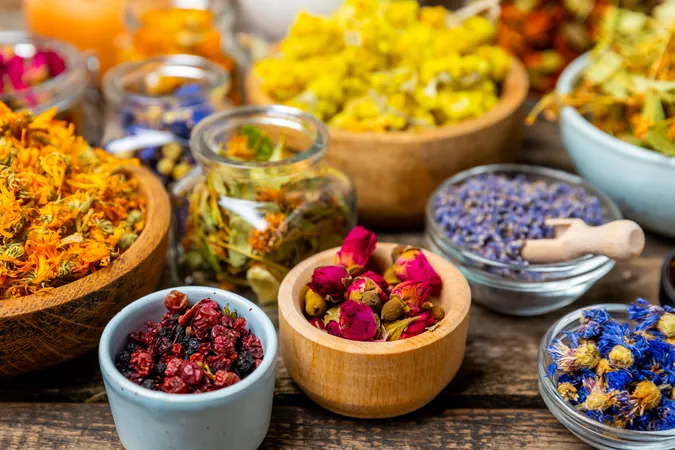
Herbal Remedies: The Hidden Risks You Need to Know About!
2025-04-15
Author: Wei
Are Herbal Remedies All They’re Cracked Up to Be?
In cultures across the globe, herbal remedies have long been celebrated as natural healers. The belief that if it grows in nature, it must be safe is deeply rooted. But new research is bringing to light troubling concerns about the long-term use of these popular folk cures.
Radical Revelations from Recent Studies
Led by Dr. Noura Abou Zeinab at Beirut Arab University, a significant investigation has unearthed unsettling truths about commonly used herbs. While these plants have historical roots in various Middle Eastern practices for ailments like digestion and vitality, they are now being scrutinized for potential dangers.
Herbs Long Trusted—Now Under Investigation
"Medicines have historically stemmed from plants owing to their healing potential, which has greatly improved lives throughout history," Dr. Zeinab explains. However, local herbs that communities have long relied upon are increasingly seen as a health risk, especially since they haven't undergone rigorous testing for long-term consumption.
The Alarming Impact of Continued Use
In a groundbreaking study utilizing adult male rats, researchers revealed how certain herbal extracts can unexpectedly impact vital organs. Dr. Zeinab states, "Our findings stress the importance of caution when using these plants long-term. Their traditional use doesn't negate the possibility of harmful effects."
A Shift in Health Perspectives
Many consumers turn to herbal solutions hoping to avoid the pitfalls of synthetic medications, believing centuries of use ensure their safety. But experts warn: potent chemicals in some remedies can strain the liver and kidneys, underscoring the critical need for quality control in herbal products.
Caution Is Key: Experts Weigh In
Research on herbal toxicity is limited compared to the wealth of pharmaceutical studies. This knowledge gap tempts consumers to assume these products are safe without any scientific backing. Some investigations have raised concerns over everyday teas, seeds, or extracts, particularly regarding self-prescription at unregulated dosages.
Navigating Interactions with Modern Medications
Healthcare professionals urge patients to disclose any herbal supplements they take, as interactions—no matter how mild—can lead to complications, especially for those on prescribed medications. Understanding the dynamics between herbal and synthetic treatments continues to be a complex issue.
Balancing Tradition with Scientific Validation
While some believe that centuries of use imply safety, others argue for the necessity of scientific evidence for each claim, regardless of tradition. This study advocates for a cautious approach to relying on plant extracts daily—knowledge is crucial to avoiding negative health outcomes.
Looking Ahead: Future Research Directions
Future trials could explore whether moderate doses or alternative preparations of these herbs might reduce their impact on the liver and kidneys. A deeper understanding of their chemical compositions could lead to safer herbal alternatives.
Raising Awareness
Public information campaigns could help consumers recognize the risks of unmonitored herbal use, emphasizing the importance of expert guidance and education about potential downsides.
Clarifying the Fine Print on Herbal Products
Many herb labels fall short on delivering essential information. Better warnings and detailed descriptions could empower consumers to make informed choices. Companies should invest in toxicity research, as products backed by data are more likely to inspire trust.
A Harmonious Blend of Tradition and Science
With each generation, our approach to wellness evolves. Merging traditional practices with scientific inquiry allows society to reap the benefits from both realms. Decisions on herbal remedies should always involve careful consultation and contemplation. This study underscores the imperative need for ongoing research.
The findings are published in the journal Nutrients.

 Brasil (PT)
Brasil (PT)
 Canada (EN)
Canada (EN)
 Chile (ES)
Chile (ES)
 Česko (CS)
Česko (CS)
 대한민국 (KO)
대한민국 (KO)
 España (ES)
España (ES)
 France (FR)
France (FR)
 Hong Kong (EN)
Hong Kong (EN)
 Italia (IT)
Italia (IT)
 日本 (JA)
日本 (JA)
 Magyarország (HU)
Magyarország (HU)
 Norge (NO)
Norge (NO)
 Polska (PL)
Polska (PL)
 Schweiz (DE)
Schweiz (DE)
 Singapore (EN)
Singapore (EN)
 Sverige (SV)
Sverige (SV)
 Suomi (FI)
Suomi (FI)
 Türkiye (TR)
Türkiye (TR)
 الإمارات العربية المتحدة (AR)
الإمارات العربية المتحدة (AR)